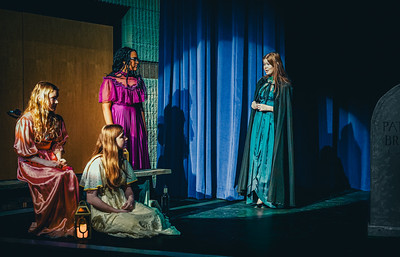This past year, many students were shocked to hear that two of the most loved teachers in the school would be leaving MPHS for good, Josh Stutsman and Abigail Ernst. Ernst was the choir conductor for two years, as well as the orchestra conductor for the 2022-2023 school year, following Mr. Vajda’s departure. Stutsman, the focus of this piece, was an English 11 and Communications teacher, but something a lot of people didn’t know about him was that he was the advisor for the video game club.
Juxtaposed against the stereotypical image of an English teacher, most people wouldn’t expect a passion for video games, but Stutsman defied those expectations. Video games played an integral role in many childhoods, his included. When asked about how he first immersed himself into video game culture, he had this to say: “I grew up on video games, my brother had a SEGA Genesis, back in the 90s… I basically had a video game controller in my hand from as early as I can remember.”
An important aspect of anything anyone chooses to immerse themselves in is their relationship with it, and the impact it has on them. When we asked Stutsman about his personal relationship with gaming, he revealed what could be considered a very unique stance, likening his relationship with video games to others’ relationships with books and reading, saying “You know how people read books because it’s escapism? That’s kind of what video games are to me in a way.” In the same vein, he talks about the way he treats video games “like works of art, it is writing, there’s narrative, there’s music, there’s acting and performance… there’s so much in it, and I love engrossing myself in that.”
For time immemorial, there has been a stigma around video games. Everybody is familiar with the stereotype of the kid in the basement from sunrise to sunset, doing nothing but bleeding the day away over some video games. That idea, however, doesn’t apply only to those who immerse themselves in video games as a hobby, illustrated when Stutsman says, “If you only read books all day and did nothing but that, then that would really get in the way of maybe your social life and relationships, so it’s the same thing with video games, too much of something is never a good thing.” He specifically calls back to May of 2023, and the release of Nintendo’s “The Legend of Zelda: Tears of the Kingdom.” “Those first few days dude, I was all in, like, literally seven hours or more in a play session, but then the time came, and I thought ‘I gotta put a time limit on myself,’ trying to balance that is super important.” Despite that need for him to restrict himself, Stutsman still says that video games have done nothing but enrich his life, something that most would consider to be against the status quo for an english teacher.
Video games, along with many other things, are subject to personal opinion. People prefer different genres and platforms. Like some people prefer rock over rap, or headphones over speakers, some prefer adventure games over action, or PC over console. These preferences are also subject to change, based on what happens around us. This variability is captured perfectly by what Stutsman said when we asked him about his preferred genre or platform. “I’m kind of a seasonal gamer, also, it’s a mood thing. Sometimes I want a nice big open world that I can go explore, I love Assassins Creed, Zelda, The Witcher, stuff like that… but sometimes that can become really trite and repetitive… sometimes I really like a cinematic, narrative focused experience, but other times, especially now, we’re in winter, I love me a good ol’ cozy JRPG.” Stutsmans current mood around gaming has him playing games like “Final Fantasy Four” and “The Legend of Zelda: Oracle of Ages.” Stutsman describes Zelda games specifically as being like “comfort food” for him, especially during this major transitional period, but if he had to choose one “genre,” it’d be fantasy. Despite that preference, he still enjoys a variety of mechanics, from action and adventure, to searing difficulty found in the likes of “Sekiro: Shadows Die Twice,” “Bloodborne,” and the famous “Dark Souls” franchise.
The “world” of gaming is constantly and rapidly evolving, both in software and in hardware. Unreal Engine 5 enabled developers to create beyond lifelike scenes, and NVIDIA, AMD, and Intel are always working to secure the next big leap in performance to drive those photorealistic experiences. Something that Stutsman found to be an important development was not so much a physical or technological advancement, but rather a culture shift. Even more interesting is the fact that it’s turning back to the past rather than looking further into the future. “I think an important development that’s happening that’s really interesting is the reverting back to what works, like classic style… things like ‘Rain World,’ and then ‘Sea of Stars’ just came out… ‘Katana Zero’ and all these really cool indie games.” This reversion back to well rooted formulas isn’t an industry wide shift. Bigger “triple-a” studios avoid risks simply due to the cost of making games. Insomniac Games spent $300 million on “Spider Man 2,” and spending that amount of money means they have to be sure they’re making something fail-proof, and they succeeded, making an estimated $360 million. Indie developers tend to spend less on their games, but that also means that what they gain in creative license, they can lose in the pure ability to make more technically advanced. This places these games greatly at risk of falling into obscurity due to a modern hyperfixation on unique or realistic graphics, which Stutsman addresses when he says “Just because something is 8-bit or 16-bit doesn’t mean that it’s not incredible… At the end of the day, gameplay is king, if the game is fun to play, it’s going to be mostly a good game. I think when people are mostly focused on the graphics, that’s not always what makes a good game. You can look beautiful and be a crappy person, and it’s the same with games.”
The audio version of this interview will be released – sad goodbyes included – and can be found in the comments under this article. We all at The Pipeline give a warm goodbye to Stutsman and Ernst, we all wish you the best!
Video Games Don’t Happen Without You.


















Stuts • Feb 27, 2024 at 1:28 pm
Jason,
This is a great piece of writing. Thank you for the opportunity to be interviewed. I’ve always enjoy sharing our passion for video games!